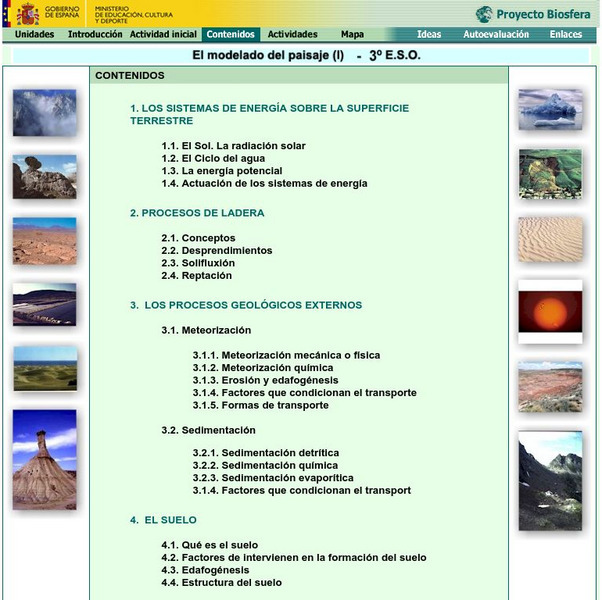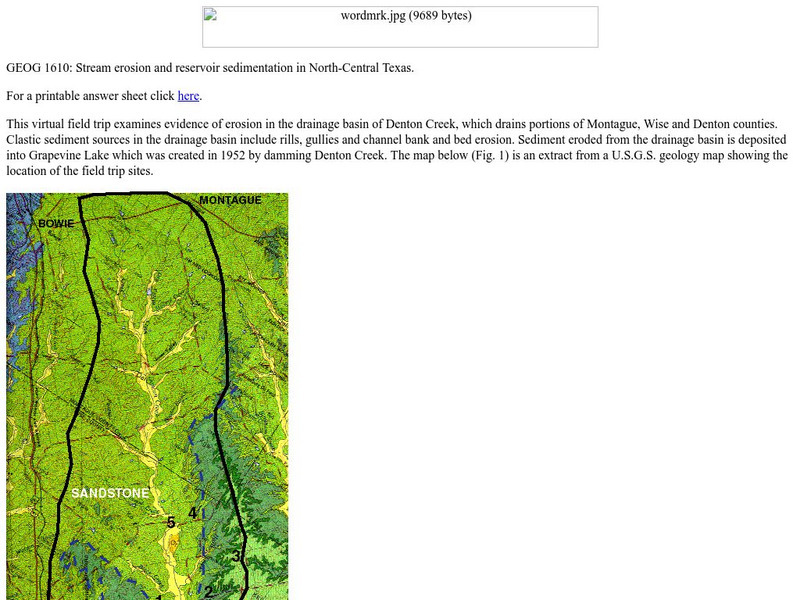Hi, what do you want to do?
Curated OER
Fossil Fuels (Part I), The Geology of Oil
Junior geologists work through three mini-lessons that familiarize them with the formation and location of fossil fuels. Part one involves reading about petroleum and where it comes from via a thorough set of handouts. A lab activity...
Purdue University
Discovering the Watershed
Human impact on watersheds can make or break an ecosystem. Learners use a game to learn about the impact human choices have on water quality and the organisms that depend on it. The activity includes a game board and game cards that tell...
NOAA
Ocean Geologic Features
Sediment samples from the ocean bottoms tell scientists about climate change, pollution, and changes in erosion for the area. Groups of learners focus on sediments and their movement through water. During a hands-on activity, they...
Environment Agency - Abu Dhabi
Sedimentation
Starting with a presentation, pupils learn about how sedimentary rocks form. They then create their own sedimentation bottle to observe the process.
Curated OER
Regents High School Examination: Physical Setting Earth Science 2009
Junior geologists address 50 multiple choice questions and 35 short answer questions about the earth system. Plenty of visuals are included for interpretation: diagrams, graphs, maps, photographs, laboratory setups, weather symbols, and...
Curated OER
Regents High School Examination: Physical Setting Earth Science 2010
Every topic under the sun is covered in this New York State Regents High School Examination. With the focus of earth science, participants answer 85 quesitons about the solar system, geologic time, rocks and minerals, landforms, and...
Curated OER
Regents High School Examination: Physical Setting Earth Science 2006
Test your class on earth science with this extensive resource. This test, created by The University of the State of New York Regents, is made up of 50 multiple choice questions and 32 short answer questions that cover the branches of...
Alabama Learning Exchange
WATER You Doing to Help?
Auntie Litter is here to educate young scholars about water pollution and environmental stewardship! Although the 15-minute video clip is cheesy, it's an engaging look at the water cycle and conservation. Learners start by illustrating...
Curated OER
Erosion Patterns
Students explore erosion when there are multiple types of sediments. They view a soil separation demonstration jar before and after agitation to determine how and why the layers settled. In addition, they conduct experiments with a river...
Curated OER
Glaciers Worksheet #2
A map of the Hudson River Valley is exhibited here. Arrows representing glacial striations are spread across the map for learners to analyze. They answer five multiple choice questions in response. The worksheet is a compact review of...
Curated OER
You Are What You Drink!
Students explore water treatment systems. In this water conservation ecology lesson, students identify and explain several processes used for water treatment and define related vocabulary after listening to content information given...
Curated OER
Sedimentation in the Grand Canyon
In this sedimentation worksheet, students use the current rate of sediment deposit by the Colorado River in the Grand Canyon to answer questions about the changes taking place in the canyon. They graph the amount of deposit over 75 years...
Curated OER
Glaciers Worksheet #1
The landscape impacted by glacier activity is drawn at the top of this worksheet. Ten multiple choice questions follow, some relating to the diagram, and some about the quality of soil left by glaciation. It is not often that you come...
Curated OER
Speed of a Forest Stream
Students study stream speed. In this stream speed lesson students complete an activity and formulate an opinion and study its effects.
Curated OER
Best Management Practices for Water Quality
Fourth graders examine best management practices for water quality. In this water quality instructional activity, 4th graders explore unused land to identify areas of runoff, erosion, and effects of water flow. Students...
Curated OER
Fossils: Part of the Picture
In this fossils worksheet, students read how scientists use fossils to gather evidence about ancient animals and plants. Then students complete 2 short answer questions.
Curated OER
Layers Upon Layers
Students model how layers of sediments are deposited. They use logic to derive rules or laws that can be used to examine layers of sediment in a cup and apply it to the real world.
Curated OER
Silting Situations
Students study the concept of sedimentation, the process of silting as it effects a man-make lake such as the Kansas-Lower Republican Basin.
Science Buddies
Science Buddies: Sorting Out Sedimentation
Sedimentary rock forms in layers that are deposited one after the other over long periods of time. Oftentimes, sedimentary rock contains fossils and other debris that are deposited within the layers. Use this experiment to investigate...
Arizona State University
Arizona State University: A Look Into the Water Treatment Process
Lesson explores water treatment process using techniques of coagulation, sedimentation, filtration, and disinfection.
Science Education Resource Center at Carleton College
Serc: Investigating Erosion
In this investigation, students will use sand to build a mountain and then use a straw and watering can to simulate wind erosion and water erosion. Students will make observations and then propose ways to slow the erosion and/or speed...
National Institute of Educational Technologies and Teacher Training (Spain)
Ministerio De Educacion: El Modelado Del Paisaje I
This unit will discuss how the external geological agents cause the arrangement of the landscape that can be found throughout the earth. It contains 18 interactive activities.
Other
University of North Texas: Stream Erosion
An introduction to the basic concepts of stream erosion, with illustrated examples from a creek called Denton Creek. Contains review questions at the bottom of the page.
Minerals Ed
Minerals Ed:kamloops"cache Creek"pavilion Lake Field Trip [Pdf]
Learn all about geological formations through this field trip from Kamloops through Cache Creek to Pavilion Lake. Formations discussed include ancient volcanism, plutonism, sedimentation, deformation and glaciation.




























![Minerals Ed:kamloops"cache Creek"pavilion Lake Field Trip [Pdf] Website Minerals Ed:kamloops"cache Creek"pavilion Lake Field Trip [Pdf] Website](https://static.lp.lexp.cloud/images/attachment_defaults/resource/large/FPO-knovation.png)